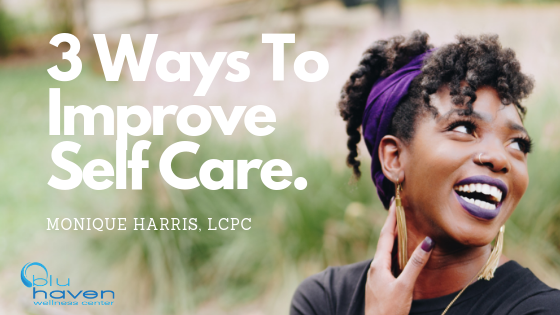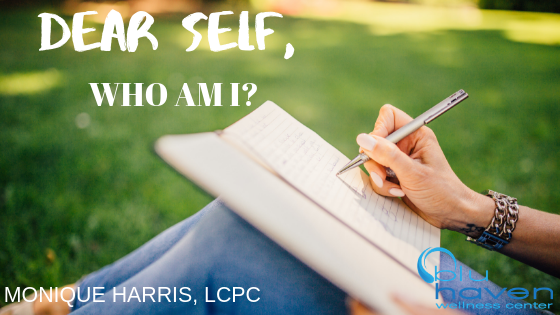
Resources to Support You,
Wherever You Are
Insights, tools, and reflections from our therapists to help you navigate life with greater clarity and care.

3 Ways To Improve Self-Care
You ever notice that when you wake up your thoughts get bombarded with things-to-do for your family, job, school or whoever? You find that you’re unable to make time for your self due to overwhelming thoughts and always being on the go! You can’t sleep, feeling emotionally and physically exhausted, you experience a sense of dreadfulness, or have a difficult time concentrating. When asked the question: “What do you do for self care?”
You respond “I’m at a point where I feel like I have to complete everything on my to-do list before I can take care of my self”.
Self Care is the key to living a balanced life. You cant take care of others if you don’t take care of yourself first. Check out these 3 ways to improve your self care today!

Dear Self, Who Am I?
You’re experiencing a time in your life where you have so much on your mind. It feels as if your drowning in your thoughts. You’re struggling to process and control your self-loathing comments. As you focus on your thoughts you recognize that the way you act, dress and appear in general is based on how you want to be perceived by others. These thoughts leave you to further question the real you. As a result, you feel lost and confused. You just want to be happy. You want to live for yourself and no longer for others anymore! But how?

Depression: 3 Things You Need To Know
Perhaps you’re feeling sad, blue, down and irritable? During the week you’re having trouble sleeping at night. You notice an increase in the fights you’re having with friends and family. Suddenly, there’s no interest in activities you once enjoyed. When you try to reach out to friends it feels like you have lost your connections. You’re feeling sad, upset and overwhelmed.
Is this a sign depression? Continue reading so that you can learn 3 things about depression is and what you can do.

Can Gratitude Tame Your Inner Critic?
Is your inner critic running your life? You know the voice—the one forged in every criticism you have ever heard and loves to pop up anytime you face a difficult situation.
The inner critic is ruthless.
Imagine this scenario: you wake up and check your email and the first one you read is from a coworker. The email is poorly toned and critical of your work. The inner critic sees its opportunity and pounces. You are a failure, it says. The world is untrustworthy and people are bad, it says (the inner critic loves to make generalizations). The rest of your day is stuck in a vicious feedback loop of negativity.
We all have that awful voice and left unchecked it can be the loudest thing we hear.
Developing powerful tools, such as a practice of gratitude, can help you control your inner critic so that it doesn’t control you, your day, or your relationships.

Does Grief Ever End?
I walked 500 miles through Spain to process my grief.
My father is dead—a fact that has lurked in the background of nearly every moment of my life for the last two years.
At times, it would sneak up on me and shake me to the core. Most of the time, I was overwhelmed by shame, fear, and sadness about all I did wrong after he was diagnosed with dementia and I found myself entirely responsible for his care. I did, even though it was not logical, feel responsible for his death. He had fallen in the night—possibly after a heart attack—which is how I found him, an image seared into my vision. After a time, anger became the dominant emotion, infecting every aspect of my life.
Something had to change. I decided to walk 500 miles through Spain.
The journey gave me the space and time I needed to face my grief.
Here I share four things I learned about the grieving process.

Practice Wellness for a Better You in This New Year
Are you making wellness a priority in the new year but don’t know where to start? Below is a list of practices to fill your wellness tool kit and build resiliency this year.
But first, let’s talk about what it means to be well and how you can achieve it.

How Do You Overcome a Painful Experience?
Are you troubled by a pattern of behavior that does not serve you? There might be a painful experience in your past driving your reactions.
I believe trauma with a little “t” can cause damage to a person’s wellbeing long after an event has faded. Taking the sting out of the memory, like overcoming big “T” trauma, means taking back control of your emotional reaction.

5 steps to Start a Daily Exercise Routine and Feel Better
Exercise releases feel-good endorphins, according to the Mayo Clinic.
Besides impacting mental health, daily exercise protects against chronic disease and can help increase your life span. Yet, less than a quarter of us exercise daily.
So why do we resist something so good for us? That first step—getting started—may be the biggest obstacle.

Understanding Trauma: Awareness is Where Healing Begins
You’re doing all the things—showing up for work, for family, for others. But inside, you might feel like you’re holding your breath… waiting for life to finally feel safe, steady, or peaceful. Maybe you’re tired of reacting to things in ways you don’t fully understand. Maybe you’re wondering, “Why do I still feel this way?”
Here’s the truth:
You’re not too much. You’re not broken. And you’re not alone.
You might be carrying trauma.

What Healing Really Looks Like (Hint: It’s Not Always Pretty) (Copy)
Hey sis,
If you’re reading this, I want you to take a deep breath — right here, right now.
Because the truth is… you carry a lot. You’ve likely been carrying it for a long time. Not just your own responsibilities, but the weight of everyone else’s expectations, the unspoken rules, the need to hold it all together.
And sometimes, that weight isn’t even from this season of your life — it’s been passed down, generation after generation. Maybe your mother taught you how to survive. Her mother, too. Maybe no one ever taught you how to rest — how to be soft, still, or supported.
Let’s talk about that. And let’s talk about how you begin to heal.

What Healing Really Looks Like (Hint: It’s Not Always Pretty)
Healing is tender. Messy. Brave. Uncomfortable. Beautiful.
Sometimes, it looks like crying through a session.
Other times, it looks like staying in bed instead of showing up for people who drain you.

The Space Between “I’m Sorry” and “I Forgive You”
She sat across from me in session, hands tucked between her knees, eyes steady but soft.
And then she said something I’ll never forget:
“He said he was sorry, and I know he meant it… but I still feel the weight. I thought it would disappear when I heard the words.”
That moment stayed with me, because it reflects a truth we don’t talk about enough:
Apologies don’t automatically equal healing.
